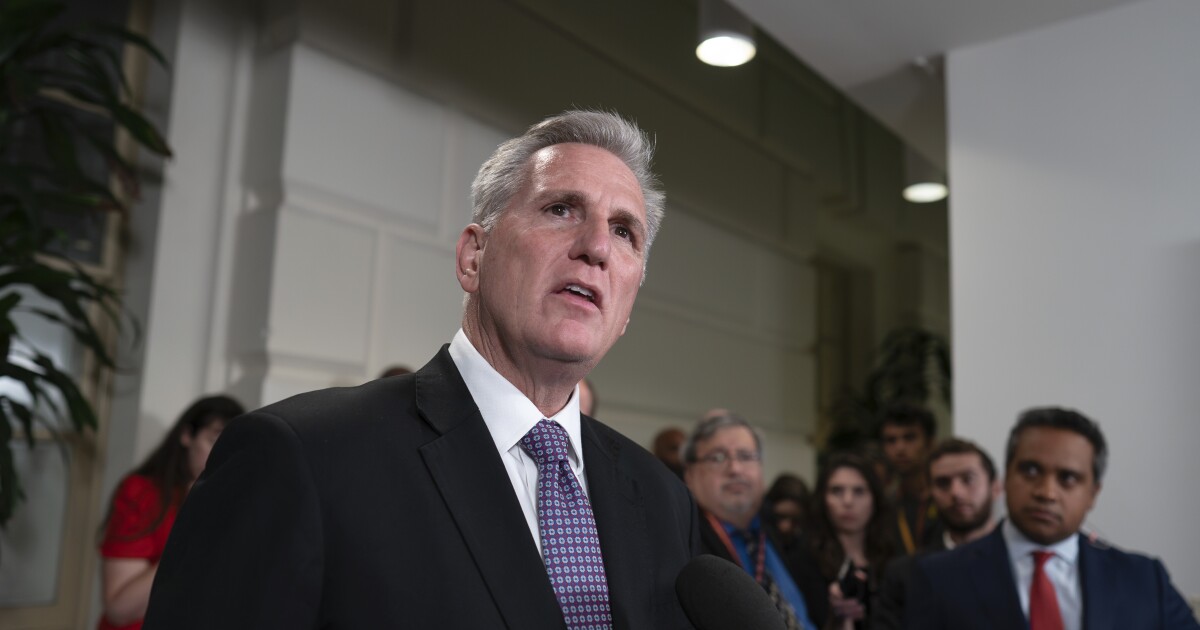

House Speaker Kevin McCarthy (R-CA) was able to get a 45-day continuing resolution passed through the House of Representatives on Saturday in an effort to avoid a government shutdown on Sunday.
The stop-gap bill does not have funding for Ukraine, which was a major sticking point for some Republicans, but does include disaster relief funds. The measure will now be sent to the Senate for consideration.
HOUSE TO PUSH 45-DAY CONTINUING RESOLUTION ON FLOOR THAT EXCLUDES UKRAINE FUNDING
Despite concessions to more conservative members of the Republican caucus, not every Republican supported the bill. The bill needed a two-thirds vote of the House to pass it because it was being voted on suspension, and the bill prevailed by a 335-91 vote.
One Democrat and 90 Republicans voted against the stop-gap bill. Here are the Republicans who voted against the stop-gap bill:
Rep. Robert Aderholt (R-AL)
Rep. Babin (R-TX)
Rep. Jim Banks (R-IN)
Rep. Bean (R-FL)
Rep. Andy Biggs (R-AZ)
Rep. Dan Bishop (R-NC)
Rep. Lauren Boebert (R-CO)
Rep. Mike Bost (R-IL)
Rep. Josh Brecheen (R-OK)
Rep. Ken Buck (R-CO)
Rep. Tim Burchett (R-TN)
Rep. Eric Burlison (R-MO)
Rep. Kat Cammack (R-FL)
Rep. Ben Cline (R-VA)
Rep. Michael Cloud (R-TX)
Rep. Andrew Clyde (R-GA)
Rep. Mike Collins (R-GA)
Rep. Eli Crane (R-AZ)
Rep. Warren Davidson (R-OH)
Rep. Scott DesJarlais (R-TN)
Rep. Jeff Duncan (R-SC)
Rep. Ron Estes (R-KS)
Rep. Mike Ezell (R-MS)
Rep. Pat Fallon (R-TX)
Rep. Scott Fitzgerald (R-WI)
Rep. Scott Franklin (R-FL)
Rep. Russell Fry (R-SC)
Rep. Russ Fulcher (R-ID)
Rep. Matt Gaetz (R-FL)
Rep. Tony Gonzales (R-TX)
Rep. Bob Good (R-VA)
Rep. Lance Gooden (R-TX)
Rep. Paul Gosar (R-AZ)
Rep. Mark Green (R-TN)
Rep. Marjorie Taylor Greene (R-GA)
Rep. Morgan Griffith (R-VA)
Rep. Michael Guest (R-MS)
Rep. Harriet Hageman (R-WY)
Rep. Andy Harris (R-MD)
Rep. Diana Harshbarger (R-TN)
Rep. Kevin Hern (R-OK)
Rep. Clay Higgins (R-LA)
Rep. Wesley Hunt (R-TX)
Rep. Ronny Jackson (R-TX)
Rep. Mike Johnson (R-LA)
Rep. Jim Jordan (R-OH)
Rep. Trent Kelly (R-MS)
Rep. Darin LaHood (R-IL)
Rep. Debbie Lesko (R-AZ)
Rep. Barry Loudermilk (R-GA)
Rep. Morgan Luttrell (R-TX)
Rep. Nancy Mace (R-SC)
Rep. Tracey Mann (R-KS)
Rep. Thomas Massie (R-KY)
Rep. Brian Mast (R-FL)
Rep. Lisa McClain (R-MI)
Rep. Richard McCormick (R-GA)
Rep. Mary Miller (R-IL)
Rep. Cory Mills (R-FL)
Rep. John Moolenaar (R-MI)
Rep. Alex Mooney (R-WV)
Rep. Barry Moore (R-AL)
Rep. Nathaniel Moran (R-TX)
Rep. Gregory Murphy (R-NC)
Rep. Troy Nehls (R-TX)
Rep. Ralph Norman (R-SC)
Rep. Jay Obernolte (R-CA)
Rep. Andrew Ogles (R-TN)
Rep. Gary Palmer (R-AL)
Rep. Greg Pence (R-IN)
Rep. Scott Perry (R-PA)
Rep. August Pfluger (R-TX)
Rep. Bill Posey (R-FL)
Rep. John Rose (R-TN)
Rep. Matt Rosendale (R-MT)
Rep. Chip Roy (R-TX)
Rep. David Schweikert (R-AZ)
Rep. Keith Self (R-TX)
Rep. Victoria Spartz (R-IN)
Rep. Greg Steube (R-FL)
Rep. Tom Tiffany (R-WI)
Rep. William Timmons (R-SC)
Rep. Jeff Van Drew (R-NJ)
Rep. Beth Van Duyne (R-TX)
Rep. Michael Waltz (R-FL)
Rep. Randy Weber (R-TX)
Rep. Daniel Webster (R-FL)
Rep. Roger Williams (R-TX)
Rep. Rudy Yakym (R-IN)
Rep. Ryan Zinke (R-MT)
Five Republicans, Reps. Buddy Carter (R-GA), John Carter (R-TX), Byron Donalds (R-FL), John Joyce (R-PA), and Anna Paulina Luna (R-FL), along with two Democrats, Rep. Mary Peltola (D-AK) and Rep. Katie Porter (D-CA), did not vote on the bill.
The lone Democrat to oppose the stop-gap bill was Rep. Mike Quigley (D-IL).
CLICK HERE TO READ MORE FROM THE WASHINGTON EXAMINER
If a continuing resolution is not agreed by both chambers of Congress before Oct. 1, then the government will shut down, and hundreds of thousands of federal workers will be furloughed or have to work without pay. The government has not shut down since the December 2018 shutdown, which lasted 35 days, ending in January 2019.
A government shutdown would see many federal agencies closed down, with the exception of essential services for the federal government. Those still required to work would do so without pay until the government reopens. Congress would still receive its pay during the shutdown because it is constitutionally mandated.





